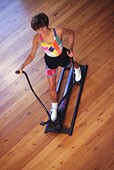Stroke Risk Plummets With Healthy Lifestyle
Quitting smoking, eating properly and exercising protects your brain, study finds.
By Serena Gordon
HealthDay Reporter
|
E-mail this article
Subscribe to news
Printer friendly version
|

(SOURCES: Stephanie Chiuve, Sc.D., research associate, department of nutrition, Harvard School of Public Health, Boston; Paul Cullis, M.D., chief, neurology, St. John Hospital, Detroit; Aug. 26, 2008, Circulation)
MONDAY, Aug. 11 (HealthDay News) -- Living a healthy lifestyle can cut your risk of stroke by about 80 percent, new research suggests.
Women who pursued healthy habits -- not smoking, maintaining a healthy weight, exercising regularly and drinking moderate amounts of alcohol -- had a 79 percent reduced risk of any stroke, and an 81 percent decreased risk of ischemic stroke. Men living healthy lives cut their overall risk of stroke by 69 percent and their risk of ischemic stroke by 80 percent. An ischemic stroke is the most common type of stroke, and it occurs when a blood vessel in the brain is blocked.
"We've previously found that a low-risk lifestyle was very important in preventing coronary heart disease and diabetes, and now we've also found that these healthy habits can lower your risk of stroke," said study author Stephanie Chiuve, a research associate in the department of nutrition at the Harvard School of Public Health.
The findings are published in the Aug. 26 issue of Circulation.
In the United States, stroke remains the third leading cause of death, and a major cause of permanent disability, according to the study.
Using data from the Nurses' Health Study and the Health Professionals Follow-Up Study, Chiuve and her colleagues included more than 71,000 women and almost 44,000 men for the new study. The study contained information gathered every two years on smoking status, weight, physician-diagnosed information on high blood pressure, high cholesterol, diabetes and the use of medications, including aspirin and vitamin E supplements. Physical activity was assessed with a questionnaire.
The researchers defined a low-risk lifestyle by five factors: not smoking; at least 30 minutes of moderate to vigorous physical activity on most days; drinking no more than a glass of alcohol daily for women and up to two for men (one drink is 4 ounces of wine, 12 ounces of beer, or one-and-a-half ounces of hard liquor); having a body-mass index under 25 in middle age; and eating a healthy diet, which means a higher intake of fruits, vegetables, whole grains, soy, nuts and more lean meat, along with taking a multivitamin for at least five years.
Individually, any one of these factors can have an impact on your stroke risk. For example, the study found that quitting smoking reduced the risk of stroke by about 50 percent, while having a glass of alcohol each day can cut the risk by 10 percent.
But, when all healthy lifestyle factors were combined, the risk of stroke dropped by about 80 percent.
"A healthy lifestyle is associated with an 80 percent lower risk for ischemic stroke compared to people who have none of these lifestyle factors," said Chiuve, who added that "more than half of ischemic strokes might have been prevented if everyone adhered to these healthy lifestyle factors."
Dr. Paul Cullis, chief of neurology at St. John Hospital in Detroit, said, "These things you can do yourself without your doctor's intervention are very important in making you healthier. This study tells us that we're in the driver's seat, and hopefully gets people more engaged in the process of trying to make themselves healthier."
More information
The American Heart Association has more advice on what you can do to reduce your risk of stroke and heart attack. 
Copyright © 2008 ScoutNews, LLC. All rights reserved. 
HealthDayNews articles are derived from various sources and do not reflect federal policy. healthfinder.gov does not endorse opinions, products, or services that may appear in news stories. For more information on health topics in the news, visit the healthfinder.gov health library.